Unit 2 Sporting events Grammar and usage(2)_ Modal verbs_ comparisons 课件(25张PPT)
文档属性
| 名称 | Unit 2 Sporting events Grammar and usage(2)_ Modal verbs_ comparisons 课件(25张PPT) |

|
|
| 格式 | zip | ||
| 文件大小 | 49.1KB | ||
| 资源类型 | 教案 | ||
| 版本资源 | 牛津译林版 | ||
| 科目 | 英语 | ||
| 更新时间 | 2020-01-09 00:00:00 | ||
图片预览


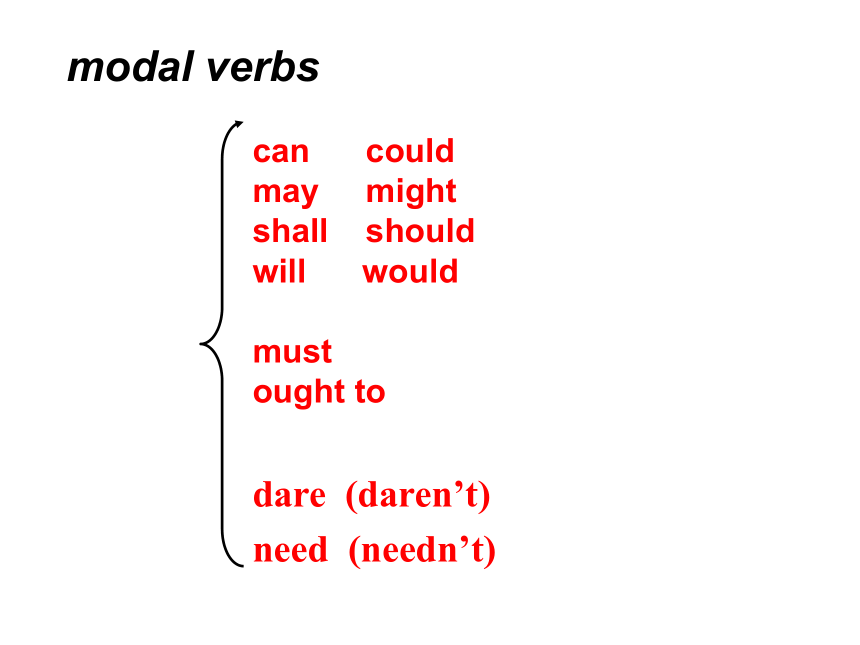
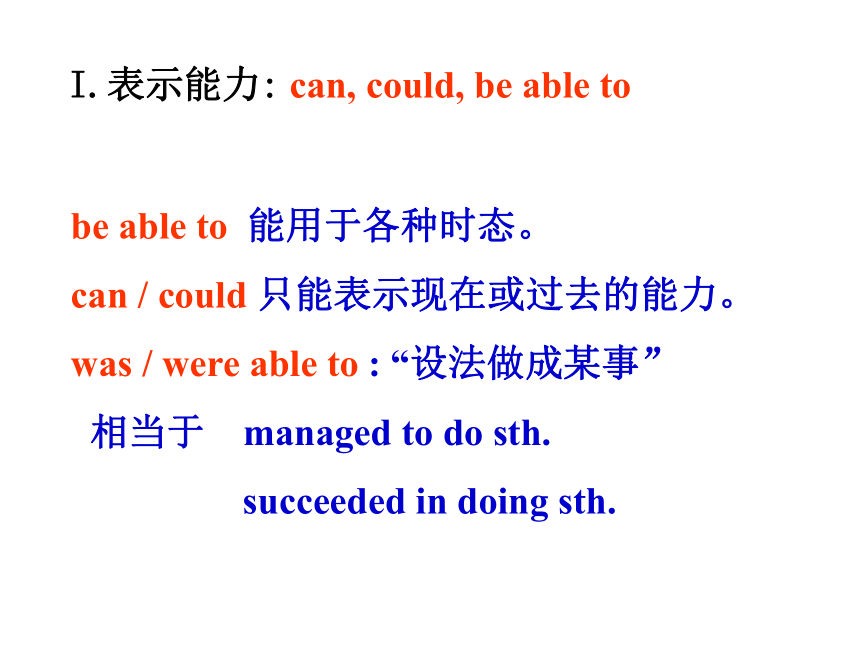
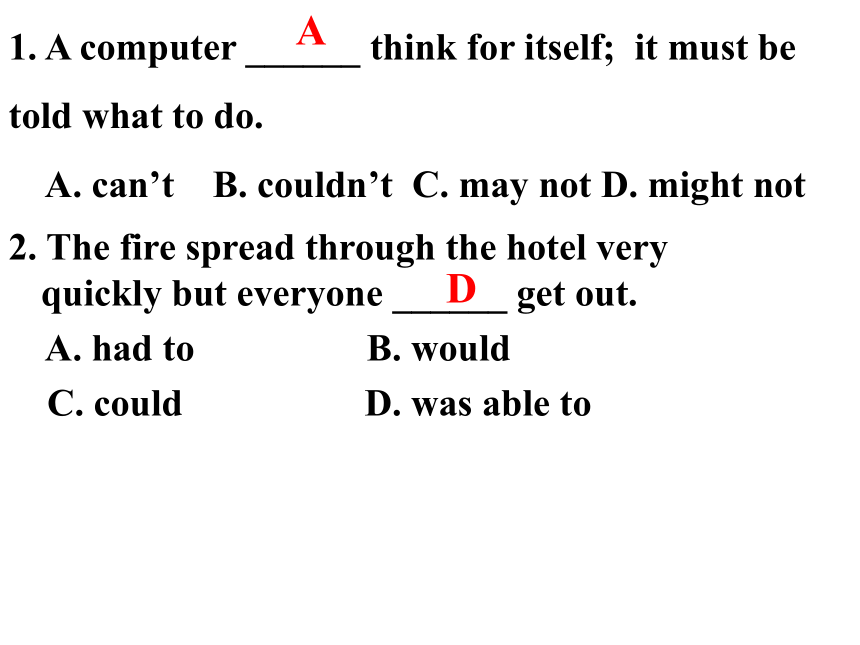
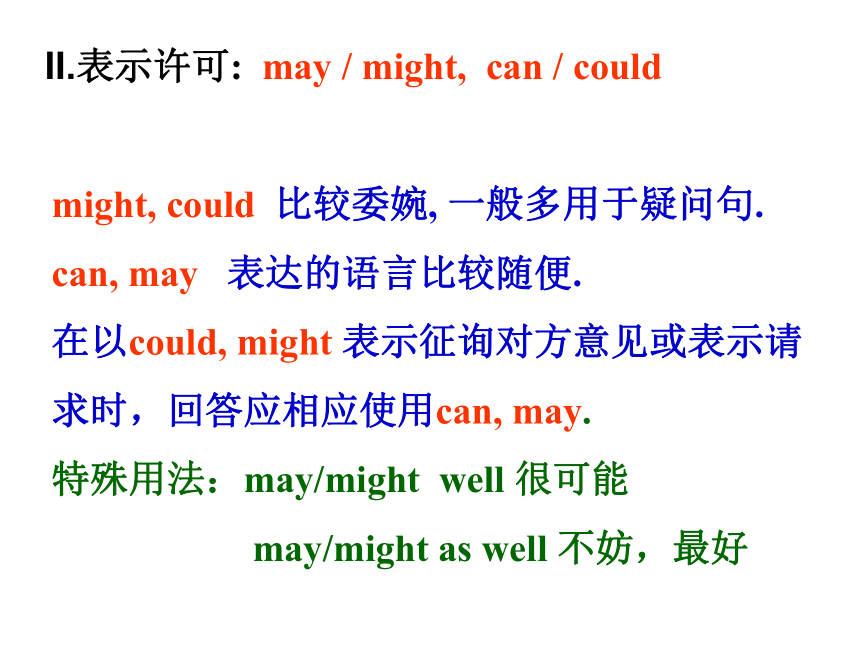
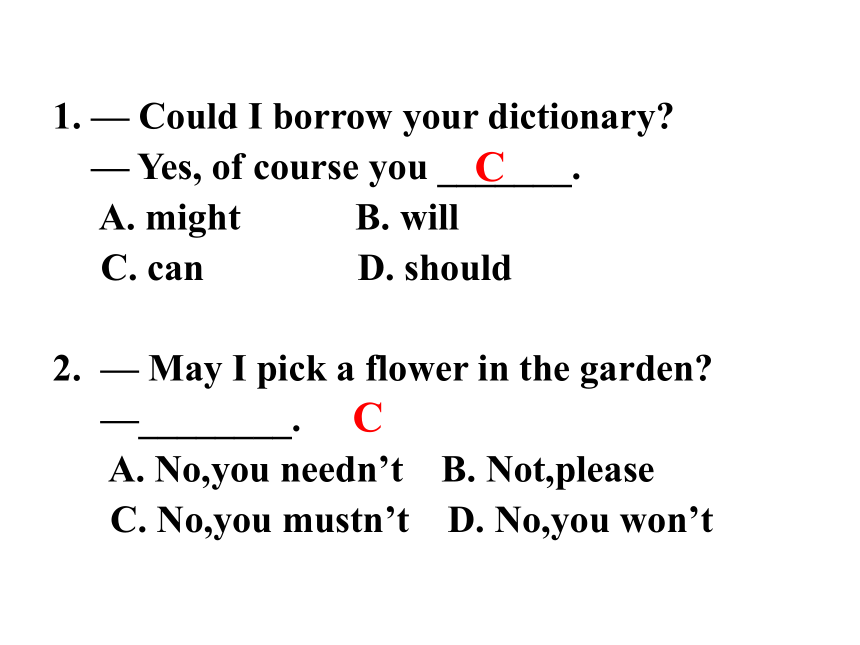
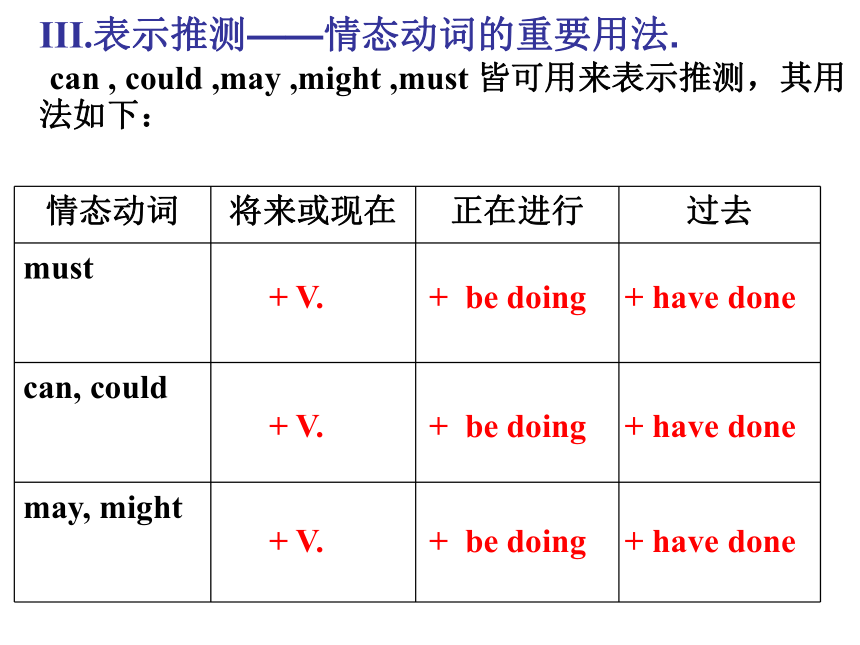
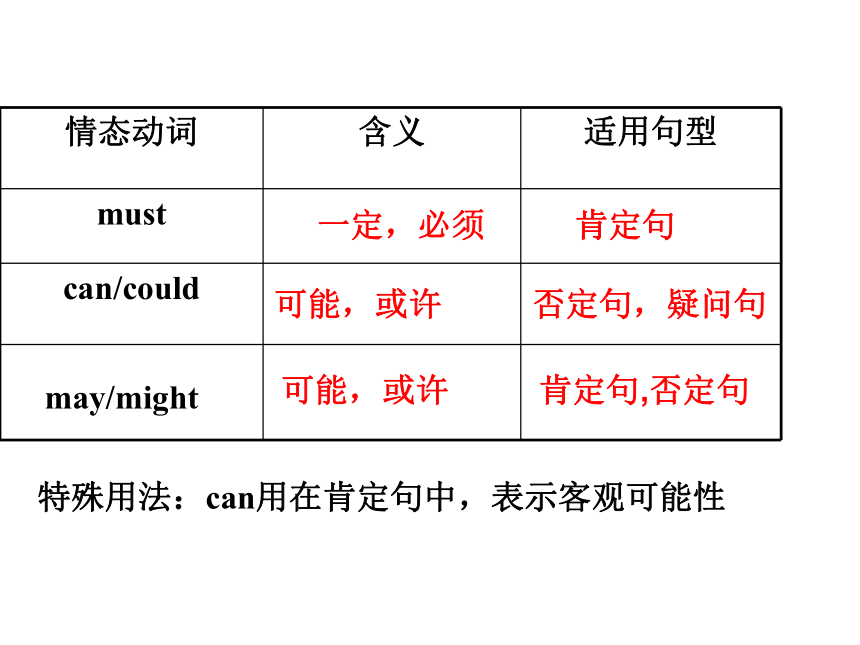
文档简介
课件25张PPT。情态动词的用法
1. 情态动词表示说话人对_____________的态度,可以表示__________________________________等之意。
2. 情态动词没有________的变化。但不能__________动词用,必须和不带to的不定式连用构成谓语动词。只有情态动词ought要和带to的动词不定式连用,在句中作谓语用。
3. 将情态动词置于主语之前即构成其____,在情态动词之后加not既构成其________。 【情态动词的语法特征 】某一动作或状态“可能”、“可以”、“需要”、“必须”或“应当”人称和数单独作谓语疑问式否定式can could
may might
shall should
will would
must
ought todare (daren’t)
need (needn’t) modal verbs I.表示能力: can, could, be able to be able to 能用于各种时态。
can / could 只能表示现在或过去的能力。
was / were able to : “设法做成某事”
相当于 managed to do sth.
succeeded in doing sth.1. A computer ______ think for itself; it must be told what to do.
A. can’t B. couldn’t C. may not D. might not
A 2. The fire spread through the hotel very quickly but everyone ______ get out.
A. had to B. would
C. could D. was able toDII.表示许可: may / might, can / could might, could 比较委婉, 一般多用于疑问句.
can, may 表达的语言比较随便.
在以could, might 表示征询对方意见或表示请求时,回答应相应使用can, may.
特殊用法:may/might well 很可能
may/might as well 不妨,最好1. — Could I borrow your dictionary?
— Yes, of course you _______.
A. might B. will
C. can D. should
2. — May I pick a flower in the garden?
—________.
A. No,you needn’t B. Not,please
C. No,you mustn’t D. No,you won’t
CCIII.表示推测——情态动词的重要用法.
can , could ,may ,might ,must 皆可用来表示推测,其用法如下: + V. + be doing + have done + V. + be doing + have done + V. + be doing + have done 可能,或许 肯定句,否定句 一定,必须 肯定句 可能,或许 否定句,疑问句 may/might特殊用法:can用在肯定句中,表示客观可能性高考考题:
1. I thought you _____like something to read, so
I have brought you some books.
A. may B. might C. would D. must
2. I didn’t hear the phone. I ___asleep
A. must be B. must have been
C. should be D. should have beenB B 3. ---There were already five people in the car,
but they managed to take me as well.
----It ____a comfortable journey
A. can’t be B. shouldn’t be
C. mustn’t have been D. couldn’t have been
4. It is usually warm in my hometown in March, but it ____ be rather cold sometimes.
A.must B.can C.should D.would D B 用can, could, may, might 填空:
1.---Is John coming by train?---He should, but ___________not. He likes driving his car.
2.Peter____________come with us tonight, but he isn’t sure yet.
3.Sorry I’m late. I ___________have turned off the alarm clock and gone back to sleep again.
4.That___________not be Mary. She is in hospital.
5.How _________you be so stupid?may/mightmightmay/mightcancanⅣ. 表示 必须、应该的情态动词的用法:
must ①表示“必须”、“应该”之意, 其意与have to相近。其否定式mustn‘t,表示“不准”、“不许可”或“禁止”之意.
特殊用法:must表示“偏要,非要”
②对以must提出的疑问句,如作否定回答时,要用needn‘t或用don’t (doesn‘t) have to (不 必)来回答,而不用mustn’t。
---- Must we finish the work tomorrow?
---- No, you ____________________ , but you _________finish?it in three days.needn't (don't have to)mustⅤ. shall和 should的用法shall
1.shall用于第一、第三人称疑问句中、表示说话人征求对方的意见或向对方请示。例如: ??? Shall we begin our lesson?
2. shall用于第二、第三人称陈述句,表示说话人给对方的命令、警告、允诺或威胁.例如:
You shall fail if you don’t work harder.
He shall have the book when I finish reading.
He shall be punished. 警告允诺威胁should:
① should表示“建议”或“劝告”,有“应该”之意,与ought to 同义。ought to表示根据某种义务或必要“应当”做某事,语气比should强。在疑问句中,通常用should代替ought to。
②特殊用法:should表示“竟然”
③表示推测,注意与must表示推测时的区别:
He must be home by now .(断定他已到家)
He should/ought to be home by now .(不十分肯定) 1. 一What does the sign over there read?
一“No person ________ smoke or carry a lighted cigarette,cigar or pipe in this area.”
A.will B.may C.shall D. mustC2 --- I think I’ll give Bob a ring.
--- You ___. You haven’t been in touch with him for ages.
A. will B. may C. have to D. shouldD3. --- When can I come for the photos? I need them tomorrow afternoon.
---They _____ be ready by 12:00.
A. must B. should C. may D. need
B1.表意愿:
If you will wait, the manager will be here soon.
If you will take off your clothes, we will try the new clothes on you in front of the mirror.
2.表请求: Will you please… ?
3.特殊用法:表习惯性动作:
Fish _______die without water.
Whenever he meets me, he ___________over and say hello to me. VI. will和would用法willwillwill come
① would可表示过去反复发生的动作或某种倾向,有“总是、总会”等意思。would表过去习惯时比used to正式,并没有“现已无此习惯”的含义。例如:
During the vacation he would visit me every week.
②在疑问句中,用于第二人称,表示说话人向对方提出请求或许问对方的意愿时,比用will的气更加婉转,如:
Would you like some more coffee? would情态动词 (+动词原形)行为动词 needdare多用与否定句,疑问句,或条件句中; 常以needn’t 和daren’t
的形式出现;dare有其过去时dared. 多用于肯定句
need to do
dare to do
Ⅶ.可兼做行为动词的情态动词:need 、 dare判断正误:
How dare you say such a thing?
He daren’t to speak English
before such a crowd, did he?
Nobody need be afraid of catching
the disease.
These dishes needed be cleaned carefully.1.They ________ to walk in the street at night.
A. didn’t dare B. not dared
C. not dare D. dared not
2.I dare to climb that tall tree over there, but ____ ?
A. dare you B. do you
C. are you D. would you
3. You ______ return the book now. You can
keep it till next week if you like.
A. can’t B. mustn’t C. needn’t D. may notABC1. must have done3. may have done/ might have done4. need’t have done5. should have done/ shouldn’t have done
6. could have done
7. would have done / wouldn’t have done2. can’t have done/ couldn’t have doneVIII. 情态动词+ have +过去分词1.---Guess what! I have got A for my term paper.
---Great! You _____read widely and put a lot of work into it.
A. must B. should
C. must have D. should have
2.The plant is dead. I _____ it more water.
A. should have given B. will give
C. would give D. must give
3.--- I stayed at a hotel while in New York.
--- Oh, did you? You _____with Barbara.
A. could have stayed B. could stay
C. would stay D. must have stayed CAA4.Why didn’t you tell me there was no meeting today? I _____ all the way here through the heavy snow.
A. needn’t have driven B. can’t have driven
C. must have driven D. shouldn’t have driven
5. ---I wonder why Mr. Lin didn’t come to work.
---He ________ have been ill.
A. needn’t B. should C. might D. can
6.---We didn’t see him at the lecture.
---Neither did anybody else. He ________ it.
A. may not have attended B. mustn’t attend
C. shouldn’t have attended D. couldn’t have attendedACD1-5 BBCCB
6-10 BCBBC
11-15 DBDDC
16-20 CABAB
2. 情态动词没有________的变化。但不能__________动词用,必须和不带to的不定式连用构成谓语动词。只有情态动词ought要和带to的动词不定式连用,在句中作谓语用。
3. 将情态动词置于主语之前即构成其____,在情态动词之后加not既构成其________。 【情态动词的语法特征 】某一动作或状态“可能”、“可以”、“需要”、“必须”或“应当”人称和数单独作谓语疑问式否定式can could
may might
shall should
will would
must
ought todare (daren’t)
need (needn’t) modal verbs I.表示能力: can, could, be able to be able to 能用于各种时态。
can / could 只能表示现在或过去的能力。
was / were able to : “设法做成某事”
相当于 managed to do sth.
succeeded in doing sth.1. A computer ______ think for itself; it must be told what to do.
A. can’t B. couldn’t C. may not D. might not
A 2. The fire spread through the hotel very quickly but everyone ______ get out.
A. had to B. would
C. could D. was able toDII.表示许可: may / might, can / could might, could 比较委婉, 一般多用于疑问句.
can, may 表达的语言比较随便.
在以could, might 表示征询对方意见或表示请求时,回答应相应使用can, may.
特殊用法:may/might well 很可能
may/might as well 不妨,最好1. — Could I borrow your dictionary?
— Yes, of course you _______.
A. might B. will
C. can D. should
2. — May I pick a flower in the garden?
—________.
A. No,you needn’t B. Not,please
C. No,you mustn’t D. No,you won’t
CCIII.表示推测——情态动词的重要用法.
can , could ,may ,might ,must 皆可用来表示推测,其用法如下: + V. + be doing + have done + V. + be doing + have done + V. + be doing + have done 可能,或许 肯定句,否定句 一定,必须 肯定句 可能,或许 否定句,疑问句 may/might特殊用法:can用在肯定句中,表示客观可能性高考考题:
1. I thought you _____like something to read, so
I have brought you some books.
A. may B. might C. would D. must
2. I didn’t hear the phone. I ___asleep
A. must be B. must have been
C. should be D. should have beenB B 3. ---There were already five people in the car,
but they managed to take me as well.
----It ____a comfortable journey
A. can’t be B. shouldn’t be
C. mustn’t have been D. couldn’t have been
4. It is usually warm in my hometown in March, but it ____ be rather cold sometimes.
A.must B.can C.should D.would D B 用can, could, may, might 填空:
1.---Is John coming by train?---He should, but ___________not. He likes driving his car.
2.Peter____________come with us tonight, but he isn’t sure yet.
3.Sorry I’m late. I ___________have turned off the alarm clock and gone back to sleep again.
4.That___________not be Mary. She is in hospital.
5.How _________you be so stupid?may/mightmightmay/mightcancanⅣ. 表示 必须、应该的情态动词的用法:
must ①表示“必须”、“应该”之意, 其意与have to相近。其否定式mustn‘t,表示“不准”、“不许可”或“禁止”之意.
特殊用法:must表示“偏要,非要”
②对以must提出的疑问句,如作否定回答时,要用needn‘t或用don’t (doesn‘t) have to (不 必)来回答,而不用mustn’t。
---- Must we finish the work tomorrow?
---- No, you ____________________ , but you _________finish?it in three days.needn't (don't have to)mustⅤ. shall和 should的用法shall
1.shall用于第一、第三人称疑问句中、表示说话人征求对方的意见或向对方请示。例如: ??? Shall we begin our lesson?
2. shall用于第二、第三人称陈述句,表示说话人给对方的命令、警告、允诺或威胁.例如:
You shall fail if you don’t work harder.
He shall have the book when I finish reading.
He shall be punished. 警告允诺威胁should:
① should表示“建议”或“劝告”,有“应该”之意,与ought to 同义。ought to表示根据某种义务或必要“应当”做某事,语气比should强。在疑问句中,通常用should代替ought to。
②特殊用法:should表示“竟然”
③表示推测,注意与must表示推测时的区别:
He must be home by now .(断定他已到家)
He should/ought to be home by now .(不十分肯定) 1. 一What does the sign over there read?
一“No person ________ smoke or carry a lighted cigarette,cigar or pipe in this area.”
A.will B.may C.shall D. mustC2 --- I think I’ll give Bob a ring.
--- You ___. You haven’t been in touch with him for ages.
A. will B. may C. have to D. shouldD3. --- When can I come for the photos? I need them tomorrow afternoon.
---They _____ be ready by 12:00.
A. must B. should C. may D. need
B1.表意愿:
If you will wait, the manager will be here soon.
If you will take off your clothes, we will try the new clothes on you in front of the mirror.
2.表请求: Will you please… ?
3.特殊用法:表习惯性动作:
Fish _______die without water.
Whenever he meets me, he ___________over and say hello to me. VI. will和would用法willwillwill come
① would可表示过去反复发生的动作或某种倾向,有“总是、总会”等意思。would表过去习惯时比used to正式,并没有“现已无此习惯”的含义。例如:
During the vacation he would visit me every week.
②在疑问句中,用于第二人称,表示说话人向对方提出请求或许问对方的意愿时,比用will的气更加婉转,如:
Would you like some more coffee? would情态动词 (+动词原形)行为动词 needdare多用与否定句,疑问句,或条件句中; 常以needn’t 和daren’t
的形式出现;dare有其过去时dared. 多用于肯定句
need to do
dare to do
Ⅶ.可兼做行为动词的情态动词:need 、 dare判断正误:
How dare you say such a thing?
He daren’t to speak English
before such a crowd, did he?
Nobody need be afraid of catching
the disease.
These dishes needed be cleaned carefully.1.They ________ to walk in the street at night.
A. didn’t dare B. not dared
C. not dare D. dared not
2.I dare to climb that tall tree over there, but ____ ?
A. dare you B. do you
C. are you D. would you
3. You ______ return the book now. You can
keep it till next week if you like.
A. can’t B. mustn’t C. needn’t D. may notABC1. must have done3. may have done/ might have done4. need’t have done5. should have done/ shouldn’t have done
6. could have done
7. would have done / wouldn’t have done2. can’t have done/ couldn’t have doneVIII. 情态动词+ have +过去分词1.---Guess what! I have got A for my term paper.
---Great! You _____read widely and put a lot of work into it.
A. must B. should
C. must have D. should have
2.The plant is dead. I _____ it more water.
A. should have given B. will give
C. would give D. must give
3.--- I stayed at a hotel while in New York.
--- Oh, did you? You _____with Barbara.
A. could have stayed B. could stay
C. would stay D. must have stayed CAA4.Why didn’t you tell me there was no meeting today? I _____ all the way here through the heavy snow.
A. needn’t have driven B. can’t have driven
C. must have driven D. shouldn’t have driven
5. ---I wonder why Mr. Lin didn’t come to work.
---He ________ have been ill.
A. needn’t B. should C. might D. can
6.---We didn’t see him at the lecture.
---Neither did anybody else. He ________ it.
A. may not have attended B. mustn’t attend
C. shouldn’t have attended D. couldn’t have attendedACD1-5 BBCCB
6-10 BCBBC
11-15 DBDDC
16-20 CABAB
